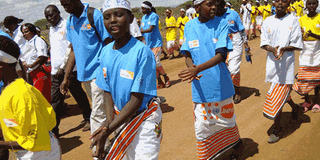FGM, domestic violence rates rise in Samburu

Girls from the Samburu community in an anti- FGM awareness campaign. FGM has become rampant as a result of Covid-19 regulations including curfew. PHOTO | POOL | NATION MEDIA GROUP
Samburu County has experienced a sharp increase in gender-based-violence (GBV) since the dusk to dawn curfew was imposed.
According to Samburu Girls Foundation, girls and women in rural areas are most affected by cases of Female Genital Mutilation (FGM), sexual exploitation, early marriages and domestic violence.
Samburu Girls Foundation Executive Director Josephine Kulea says restriction of movement and curfew, while helpful in curbing further spread of Covid-19, can leave vulnerable victims trapped at the claws of their prey.
"Cases in Samburu are always high but in the past one month, we have received numerous cases and have doubled. This means the curfew and the stay-at-home period has had so many violence cases," Dr Kulea says.
She reveals that there could be more cases across the county, which go unreported because women fear the repercussions that come with that.
Dr Kulea says: "These cases mostly happen at dawn and if one is oppressed, she cannot move out to escape the house (Manyatta) because of the curfew."
She notes that stigma and inferiority complex are also derailing the fight against the retrogressive cultural practice of FGM.
Forced FGM
Girls as young as eight years, she says, were forced to undergo the cut far away from the glare of the public and law enforcement agencies, driven by the never-ending urge by local elders to pass the practice to future generations.
She says more than 250 girls, across the county, have been subjected to the decadent practice that has taken root in the region.
Kulea says cases of FGM have escalated during this period and a huge percentage of girls could be at risk of dropping out of school to undergo FGM, followed by forced marriage.
"Very few will go back to school because normally after circumcision, girls end up being married off by their parents," she projects.





